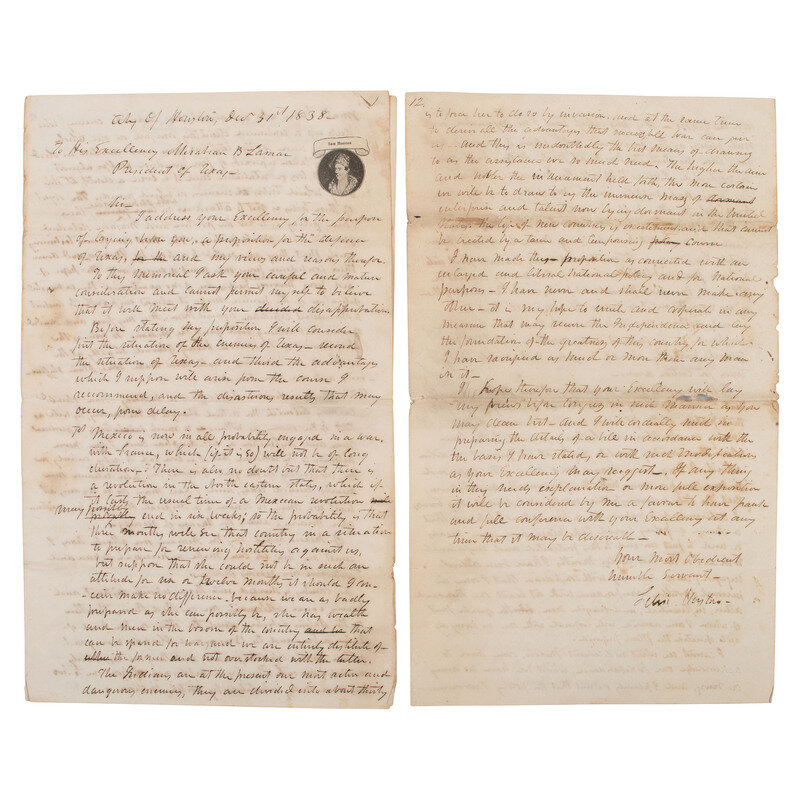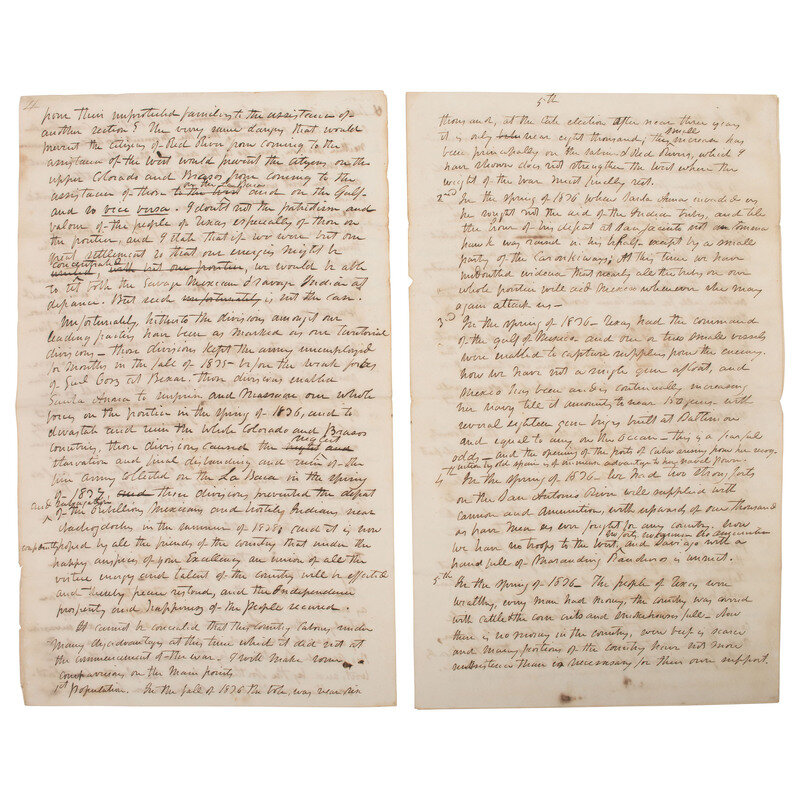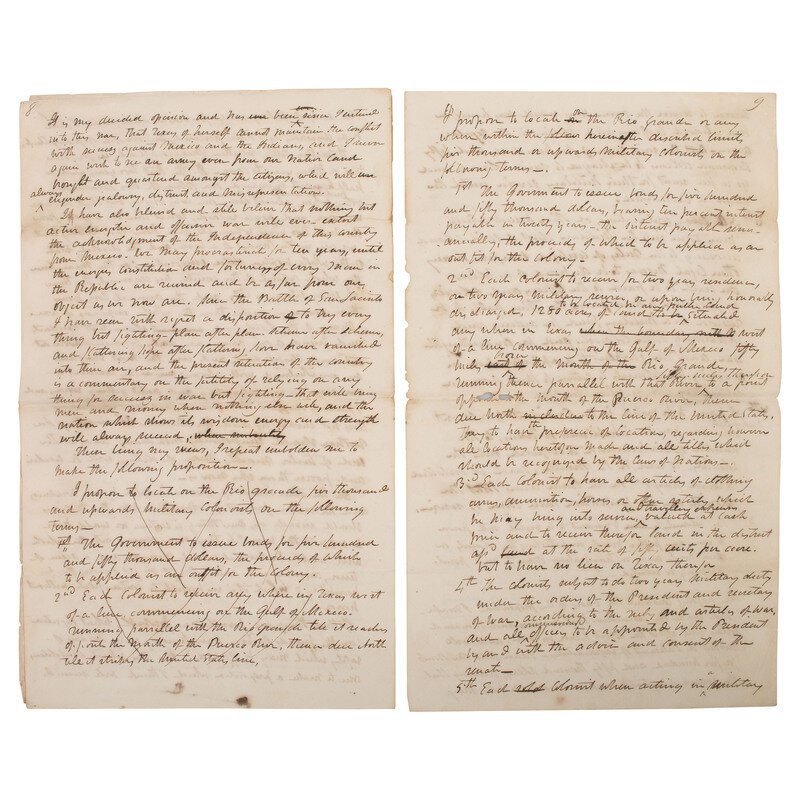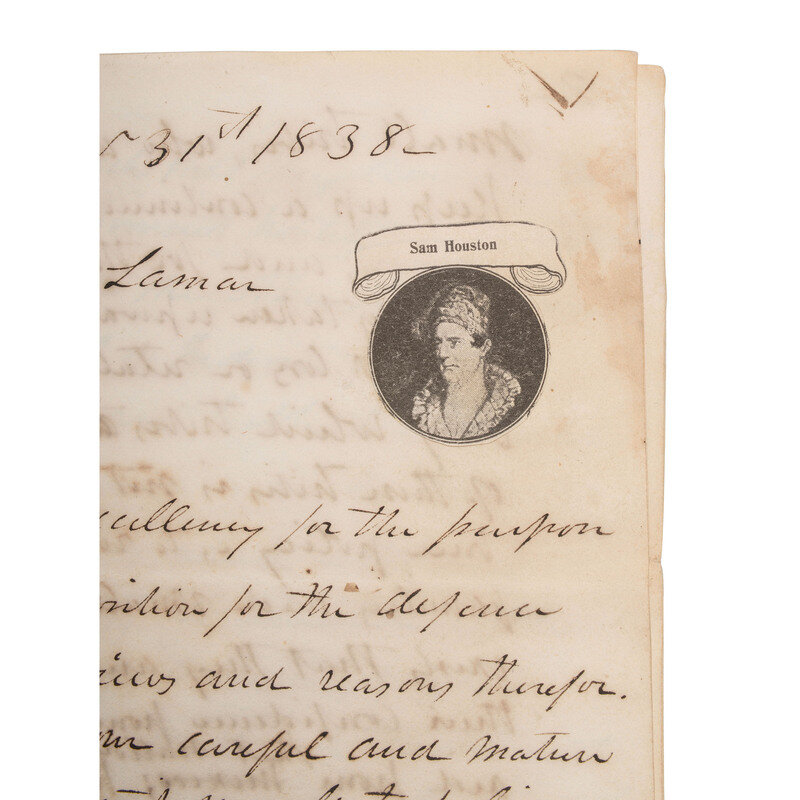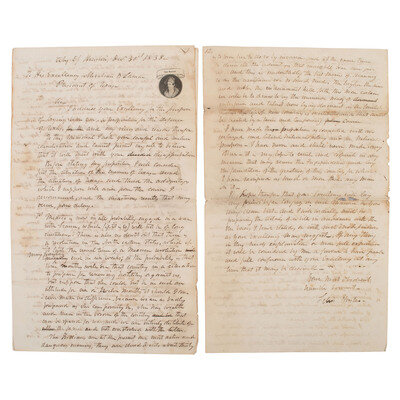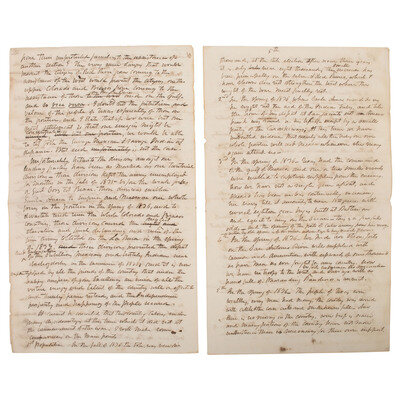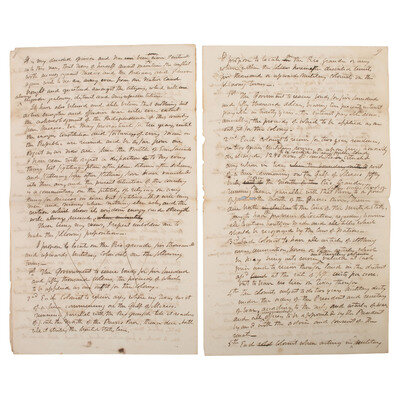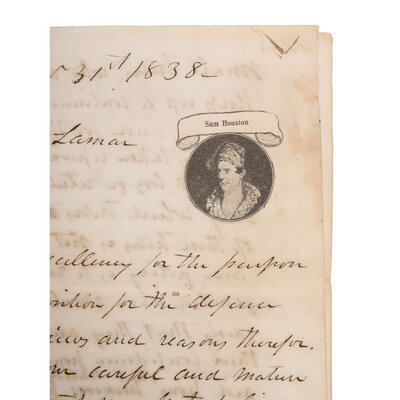Condition Report
Contact Information
Auction Specialist
Lot 208
Sale 6425 - American Historical Ephemera and Early Photography, including The Larry Ness Collection of Native American Photography
Part I - Lots 1-222
Oct 23, 2025
10:00AM ET
Part II - Lots 223-376
Oct 24, 2025
10:00AM ET
Live / Cincinnati
Own a similar item?
Estimate
$2,000 -
3,000
Price Realized
$8,400
Sold prices are inclusive of Buyer’s Premium
Lot Description
[REPUBLIC OF TEXAS]. HUSTON, Felix (1800-1857). Autograph letter signed ("Felix Huston"), "To His Excellency Mirabeau B. Lamar President of Texas," a draft detailing "a proposition for the defense of Texas." City of Houston, 31 December 1838.
12pp, 8 x 13 in. (creasing at folds, light dampstaining, small losses at center fold pages 9-12). Draft with edits throughout, possibly Huston's retained copy of the original letter he submitted to Lamar which is held in the collections of the Texas State Library and Archives and is published in the The Papers of Mirabeau Buonaparte Lamar, Vol. II [1921-1927], pages 376-383. First page with decorative "letterhead" at top right corner constituting a printed image of Sam Houston in Cherokee Dress (image ca 1830) below a printed scroll bearing the name "Sam Houston," both of which appear to have been cut from a separate publication and applied to the letter.
"I DOUBT NOT THE PATRIOTISM AND VALOUR OF THE PEOPLE OF TEXAS...."
Huston opens his letter to Lamar with a clear statement of intent: "I address your Excellency for the purpose of laying before you a proposition for the defence of Texas, and my views and reasons therefor...Before stating my proposition I will consider first the situation of the enemies of Texas - second the situation of Texas - and third the advantages which I suppose will arise from the course I recommend, and the disastrous result that may occur, from delay." Huston expresses his concerns related to the vulnerabilities of various regions of Texas which are distant, and difficult to defend. "How then can the people of one section be drawn from their unprotected families to the assistance of an other section? The very same dangers that would prevent the citizens of Red River from going to the assistance of the west, would prevent the citizens of the upper Colorado and Brazos from going to the assistance of those on the La Baca and on the Gulf-and so vice versa. I doubt not the patriotism of
the people of Texas, especially, of those of the frontier, and I state that if we were but one great settlement so that our energies might be concentrated, we would be able to set both the savage Mexicans and savage Indians at defiance. - But such is not the case... It is my decided opinion and has been since I entered into this war, that Texas of herself cannot maintain the conflict with success against Mexico and the Indians, and I never again wish to see an army even from our native land brought and quartered amongst our citizens, which will always engender jealousy distrust and misrepresentation. I have also believed and still believe that nothing but active, energetic and offensive war, will ever extort the acknowledgment of the independence of this country from Mexico...." Huston concludes with his plan for directing "military colonists" within the republic., and it in this section that his edits are most substantive in comparison with the original document.
A lawyer, military adventurer, and first commanding officer of the Army of the Republic of Texas under the Constitution of 1836, Felix Huston played an active role in the early years of Texas independence. Huston was born in Breckinridge, Kentucky, and after attending Transylvania University began practicing law in Natchez, Mississippi. By 1830 he amassed considerable wealth, much of it in the form of enslaved men, women, and children. According to the Texas State Historical Association online biography of Huston, "When word of the Texas Revolution reached him, he advocated Texas independence and solicited aid for the cause. As a propagandist for the revolution, he raised troops and money throughout Mississippi and Kentucky and incurred a personal debt of $40,000 raising and equipping soldiers for service in Texas. He left Natchez on May 5, 1836, with Rezin P. Bowie and an estimated 500 to 700 volunteers for the Texas army, marched across Louisiana, and arrived at army headquarters on July 4, too late to participate in the war for independence." On December 20, 1836, Sam Houston commissioned Huston as a brigadier general in the 2,000-man army and temporary commander-in-chief, but Huston attracted adventurers and men of little discipline to his "Camp Independence" in Jackson County. Soon Houston appointed Albert Sidney Johnston as permanent commander of the army. In ensuing months and years Huston would continue to have an aggressive military posture towards Texas's neighbors, and express concern over the young republic's ability to defend itself. The letter offered here exemplifies Huston's militaristic approach to "enemies of Texas," particularly with Mexico and the Native Americans who lived within Texas borders. Mirabeau B. Lamar had a relatively short term as President, but the years from 1838 to 1841 witnessed some of the most dramatic events of the Republic of Texas and in the history of Indian-White relations in the Southwest.
Scarce. Huston signed documents and letters rarely appear at auction.
This lot is located in Cincinnati.
